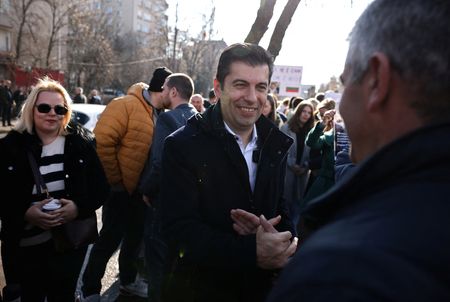By Padraic Halpin
DUBLIN (Reuters) -When Simon Harris made headlines in his local County Wicklow newspaper in 2003 for criticising the government, the future Irish prime minister was described as “a well-known local activist”. He was 16 years old.
Now 37, Harris became Ireland’s youngest ever premier on Tuesday, an ascent that while swift owing to Leo Varadkar’s shock departure, has also been more than 20 years in the making, say those who have worked with the ambitious political devotee.
He quit university aged 20 to work as a political aide, was elected a councillor at 22, a member of parliament at 24 and appointed to cabinet five months shy of his 30th birthday, where he would make his name helping steer the country’s initial response to COVID-19.
His first boss, former Irish Deputy Prime Minister Frances Fitzgerald, recalls being struck at just how keen her future cabinet colleague was to work in politics, something that was “unusual enough, even then” for a 20-year-old.
“What I thought was how very impressive he was, how very eager, energetic, intelligent and interested but most of all how he really wanted to work in the political system,” Fitzgerald, currently a member of the European parliament, told Reuters.
Harris has spoken about how he became involved in politics to campaign for support for his autistic younger brother Adam. He set up an autism awareness charity aged 15, calling it “the formative experience of my life”.
“I would say that’s what defines him, he does believe in politics and to this day, he believes in the political system as the place to be to get things done,” Fitzgerald said of her Fine Gael party colleague.
That description of a politician who works “all the hours of the day and night” was echoed by Niall Collins, a junior minister from coalition partners Fianna Fail, who has worked alongside Harris in the higher education ministry since 2020.
“His work ethic and attention to detail is enormous,” Collins told national broadcaster RTE on Sunday.
RIGHT SHIFT?
With less than a year to leave his mark in office before he must call a general election, Harris’ chief political challenge will be clawing back the more than three-year unbroken opinion poll lead the main opposition Sinn Fein party has on its rivals.
A recent slide in support for the left-wing party has opened up a possible path to re-election for another Fine Gael and Fianna Fail-led government. Polls suggest they may need the support of increasingly popular independent candidates, an arrangement the first government Harris was part of relied on in 2016.
One non-party aligned member of that cabinet, left-wing independent Finian McGrath, said that unlike some of his Fine Gael colleagues, Harris was open to compromise, a trait that could well be needed for future coalition building.
“I didn’t think I was going to get on well with him because I wouldn’t be on Fine Gael’s page at all, but I did,” McGrath, who worked with Harris in the health department from 2016 to 2020, told Reuters.
“He might give the impression that he’s a bit nerdy and some people think he’s the best boy in class and all that stuff, but no actually, you go for a pint with him and he’s great craic (fun).”
While inheriting a three-party coalition will leave Harris little room for major new policy initiatives, he is under pressure from lawmakers to move Fine Gael back towards its traditionally centre-right position.
Harris described Fine Gael on Sunday as “a centrist party”, saying he was proud of the role he played as health minister in the 2018 referendum to remove a ban on abortion, while at the same time placing a renewed focus on law and order and helping farmers.
Though Fitzgerald described her one-time parliamentary assistant as “very adaptable, flexible and not ideological”, she doubts he will shift Fine Gael away from its current position.
“I don’t believe this talk about Fine Gael pivoting to the right, he is not going to disown the social progress that has been made in Ireland,” she said.
(Reporting by Padraic Halpin, editing by Ed Osmond)














